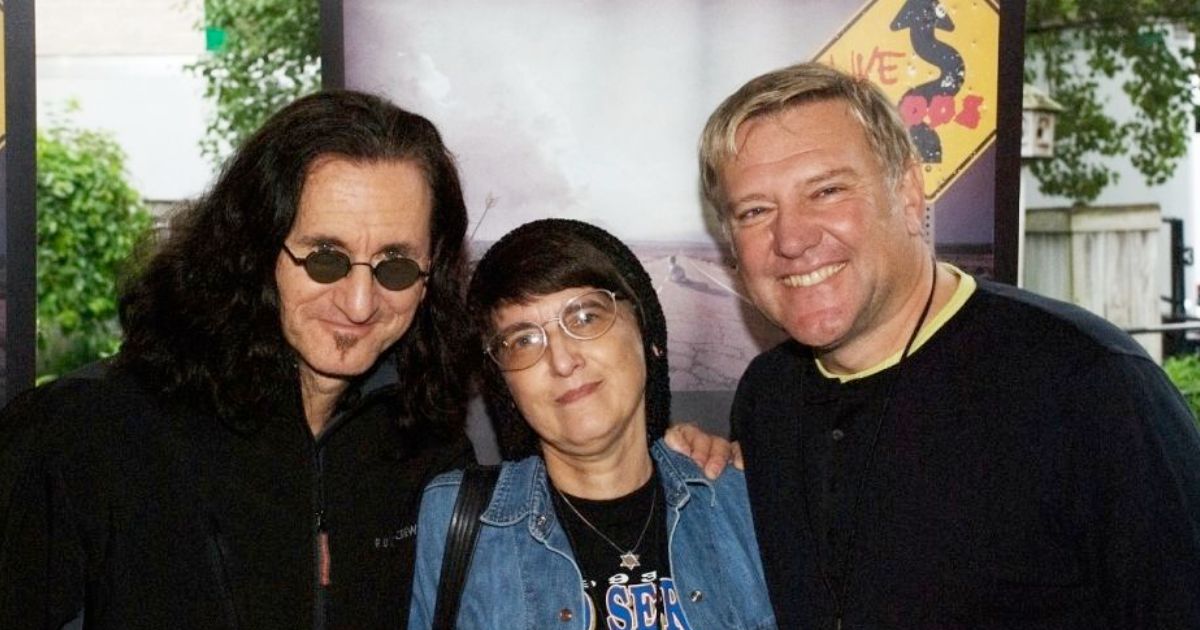Donna Halper is a very dear person in the Rush universe, because she was the radio broadcaster who revealed the band in the Land of Uncle Sam in 1974. Before that, the manager Ray Daniels had been frustrated, because he could not get any feedback for the sound of that promising power-trio which had solid influences from Led Zeppelin. Miss Halper worked for WMMS Radio FM in Cleveland, Ohio, and played “Working Man” for the first time in American territory. Instantly, listeners started callingand the phone never stopped ringing. Very shortly afterwards, Rush was able to sign a contract with Mercury Records and the World of Rock n Roll has been grateful to her every day since then.
(We have already covered this topic in “Chapter II – Finding Our Way from Beyond Brief” – just avaible in Portuguese).
Donna’s relationship with the fans is so close that you can see posters and signs at shows and events related to Rush which read: “THANK YOU, DONNA HALPER“. Nowadays, she is a professor at Lesley University in Cambridge, Massachusetts, and the author of six books and many articles covering topics such as politics, media, history and religion.
One of the key points of this interview was to give her complete freedom, so we could absorb all the knowledge she has about the band and other Rush-related topics. That´s why we care zero if this article could get huge and Donna used how many words she thought was relevant.
This is surely one of the most important Portal Rush Brasil articles and we are proud of the final result: wonder that we were talking in the same environment, like the same room, side by side. If you know Rush songs, you will notice that they were applied in our questions and her answers, like a “easter-egg” …. how cool is that?!
Well, we want to give us our special thanks to:
Marcelo Monteiro (big-fan), Vito Montanaro (Rush Project), Candice Soldatelli (Sister-in-Rush), Leo Skinner (Chorus), Ricardo Chapô (Rush Cover Rio), Miriam Nahas (fan in discovery) and Nathália Plá (fan-fan-fan).
Thank you all with YYZ.
Tânios Acácio – Creator of Portal Rush Brasil
1 PRB – Donna Halper, I think the best way to start an interview is to thank you for all the affection you have with Rush fans. It´s usual to see people wearing t-shirts, messages or banners with the message: “Thank you, Donna Halper”, like those fans in front of Rock n Roll Hall of Fame in April, 2011, pressing the organizers to include Rush at the ceremony… so thank you.
DH – I love the fans and I am grateful for their support of Rush, as well as for their kindness towards me. I have had the opportunity to meet Rush fans from all over the world, and it’s been a privilege.
2 PRB – In the 2013 ceremony of Rock n Roll Hall of Fame in which Rush was honored with David Grohl’s speech, we saw him saying “no hype, no bullshit, they did it from the ground up (…) without any help from the mainstream press: Rolling Stone (cough, cough, cough).
It was a cough aimed at a magazine, but of course that meant for many opponents of Rush. I’d like you to comment on the power-trio’s critics and the band’s secure positioning to the fans for that sort of thing.
DH – For many years, there was a group of music critics who hated Rush, who insulted their music, made jokes about Geddy’s voice, and even said the band had no talent. This, of course, was outrageous: it’s true that Rush’s first album was very basic, but after that, they continued to do amazing and creative work. But these older critics had contempt for Rush, and some tried to keep Rush out of the Rock & Roll Hall of Fame. The guys told me they didn’t mind, but deep down I am sure they were frustrated that the Rock Hall showed them no respect. Neither did Rolling Stone magazine. Meanwhile, the fans never gave up. For many years, fans from all over the world signed petitions and wrote letters, asking for Rush to be chosen; it was such a happy occasion when the guys were finally selected for induction—this was certainly one result of some of those older critics retiring. A new group of music critics took their place, and since they had grown up with Rush, they had become fans. Many wrote favorable reviews and praised Rush for their talent and their longevity. And these critics had no problem voting for them to get into the Rock Hall. So, the story had a happy ending!
3 PRB- Neil Peart in the 1990s left off with some friends cycling through the countries of Africa and faced thirst, hunger and enormous challenges in his journey that is very well described in the book “The Masked Rider”. Years later, after an intense period of mourning, he traveled for more than 55,000 miles passing through several nations of the North American continent in which we can testify with the work “Ghost Rider – Travels on the Healing Road”. Being Neil Peart unquestionably a literary reference in travel chronicles, why we do not see specialists or scholars talking about his work?
DH – But we do see it, although not as much as some of us might want. There are several books that have analyzed the lyrics and the philosophy of Rush’s music (and Neil’s lyrics). But in fairness to professors and scholars, they are not intentionally ignoring Neil. In fact, there are many rock bands who are never analyzed or written about by scholars. Unfortunately, there is still a belief that rock music is just “pop culture” and it’s not a suitable subject for academic study. Some scholars disagree with this and they do write about popular music, or analyze lyrics (this has been done with Bruce Springsteen and Bob Dylan, to give two examples). But I don’t expect more professors to write about Rush, since not many focus on analysis of rock music. I do, however, know of at least one college course (at Tiffin University in Ohio) that was devoted to the study of Rush’s music, and perhaps there are others.
4 PRB – I think that Tiffin University course should be awesome. It is just my theory, but the disciplines should address relevant topics such as: the importance of being a Working Man; the value of our individual freedom versus any governmental, religious or Temple resistance; how are the Circumtances of our choices even if We Choose Not to Decide, and last, but not least, how is our natural process of getting more experienced and aging … (I am probably afraid to Going Bald).
Well, that would be briefly what I think what a Rush course must include, but I swear I’d be the first to enroll in a course where you would be the Rush teacher.
Isn´t that a good idea? Do you approach elements of Rush’s lyrics in your journalism class?
DH – Yes, the course was fun and the students loved it. The professor did an excellent job. It was not just about Rush but about American culture and society during the years that Rush was making music. The lyrics of songs were analyzed and discussed, and I made a guest appearance too, thanks to Skype.
If I were teaching about Rush, it would be for a course that involves philosophy (Neil is a philosopher), rock history, music business history, and cultural history (how has the culture changed during the 40+ years that Rush was in the music industry? How has the music business changed? How has society changed? How did Rush’s music change over the years?).
I sometimes quote Rush, and yes, I have quoted from songs like “Free Will”; my students know I am a former deejay, so I quote from many songs! But mostly when I am teaching journalism, I am training future reporters about how to be accurate, fair, and thorough. I think Rush lyrics fit better in courses on Popular Culture or the History of Rock and Roll.https://www.youtube.com/embed/6Pys4vyxu1Y?wmode=transparent&autoplay=0&mute=0&theme=dark&controls=1&autohide=0&loop=0&showinfo=0&rel=0&enablejsapi=0
5 PRB – Nice points, Donna and I highlight “how did Rush’s music change over the years?”.
I am not a musician, but friends of mine who are agree with me that Rush keeps one identidy along those 40 years. If we gonna divide the band’s career into phases, we´ll see heavy, prog rock, new wave with Synthesizers, etc, etc etc, well In The End it´s Rush. I mean, labels never fit well when we try to describe them and if we let Alex, Geddy and Neil in a room with cans, switchblade and tree branches, they will delivery us a briliant song with this Rush branding. How can possible they do this? That´s a Macgyver gift.
DH – Actually, it’s about creativity and vision. When Rush chose Neil, they chose him not just for his skill with the drums, but for his skill with words—his ability to write intelligent and thought-provoking lyrics. Neil has repeatedly come up with new and exciting concepts, and then the guys collaborate to find the right music (sometimes it’s the other way around—Alex or Geddy think up some musical idea, and then Neil creates the right words for it). Neil loves books—he writes them, but he also reads them. He is like a poet in his ability to choose the perfect words for a song—he uses metaphors and similes beautifully. He can paint a picture with words. It’s a gift that not everyone has. Some great songwriters like Bob Dylan or Bruce Springsteen come to mind, but Neil is in a class of his own.
Rush’s music has changed because life has changed. And yet, it’s still Rush. As you know a band is affected by the world around them. As their life changes, it has an impact on the lyrics and the style of their songs. These life-changes are especially true for Neil. For example, in the 1970s, he was reading a lot of Ayn Rand, and he was influenced by her philosophy. But as he grew older and saw more about life, he gradually came to reject Rand’s philosophy. He moved away from being a conservative, and he moved away from believing it’s not a good idea to give charity to others (like, to help the poor). Rand’s philosophy is sort of “every man for himself; if you are poor, then it’s your own fault; you should work harder, but I have no obligation to help you”. But gradually, Neil came to believe that life is not always fair and the poor are not always to blame for their situation. So, his attitude changed and he became more of a moderate, perhaps even a liberal about some issues.
Losing his wife and daughter also affected him, and after he totally withdrew from music and from his friends, he ultimately came back with a new appreciation for being alive. He remarried, he devoted more time to his wife and little daughter… My point is that Neil’s journey is reflected in his lyrics and in the different types of music the band has performed. If you asked Alex and Geddy, they will say what they said in “Beyond the Lighted Stage”—as musicians, you always want to try something new. Sometimes, it works. Sometimes it needs to be revised or even completely changed. But you always want to keep growing and keep finding new ways to express your creativity, without sacricing your basic identity. I do agree that Rush have successfully experimented and tried new directions without giving up their identity.
6 – I am really enjoying that we are going deeply on those subjects. One of the last articles in Portal Rush Brasil was about how Ayn Rand influencied Neil´s head. I read both volumes of “The Fountainhead” and to be frank, I got shocked about its outcome: selfishness in a high level in a perspective, but otherwise there´s a search for an ideal if you see with protagonist´s eyes. It´s good that “Professor” knew when move away as you said.
But Ayn Rand was very popular with young people back in the 50s and 60s—a time when young people are often very self-involved (thinking a lot about themselves and their own feelings); that book, “Atlas Shrugged” told them it was okay to be selfish and not have to do anything for anyone else. Many Republicans in the US still believe that even today, sad to say.
7 – Let’s talk about Rush fans. You said that you have been talking to them all over the years and it will be awesome to hear some stories. We often post fan comments in Portal Rush Brasil. Well, I want briefly talk about my history (one of them). I worked with characters in Walt Disney World in 2005/2006: Woody from Toy Story, McQuack Launchpad, The Genie, Aladdin’s friend and mainly with Goofy. I can safely say that Goofy is a huuuuuge-huge Rush fan, and he gave me his autograph signed “Goofy Lee luvs Rush”. He asked me to deliver it to Rush if I had an opportunity. Yeah, I had it in 2010 when MTV called me to cover Clockwork Angels tour in Sao Paulo, but unfortunately one Tickets for Fun employee made a confusion with schedules and I didn’t meet them. I got pissed, but I gave it to my friend Vagner Cruz – Rush Fan Club creator – and Lifeson received personally from his hand. Thx a lot Vagner forever.
Well, we would like to hear some stories that fans have already told you at some point.
DH – Vagner and I have done some work together, as he may have told you: I have helped him to understand certain idioms and metaphors in Rush songs… I know many stories about Rush fans but my favorite ones are about the fans who never spoke English but who learned it because they wanted to understand the lyrics of Rush songs. THAT is devotion. I am not sure what kind of stories you want, but look at all of the tribute bands all over the world (including in Brazil)—so many musicians have been touched (and influenced) by Rush. I am sure some of them can tell you interesting stories about how Rush changed their life. I have also heard that from so many people who are not musicians—listening to Rush can make people feel better when they are feeling discouraged; it can give people encouragement and make them feel more confident. People have told me that Rush helped them through some of life’s most difficult moments. Rush’s music is the soundtrack of many people’s lives, in fact. (If you are asking me for specific stories from specific fans, I do not feel it would be ethical for me to use someone else’s name or story without their permission. But there are SO many fans who would be happy to talk with you, and tell you their own Rush stories.) And I can definitely say that Rush fans are like a big, extended family, with members from all over the world. It’s like having a million cousins and nieces and nephews! I have talked with Rush fans from about 15 countries—including Brazil, Spain, Chile, Argentina, Canada (of course), Japan, South Africa, Pakistan, Germany, the Netherlands, and many more.
8 – Yeah, and this work that you and he did together are very useful for Rush fans. Thank you both.
It´s very beautiful when we see the music transcending the language and connecting people in different parts on the Earth… it´s a brotherhood.
Well, when I talked about stories, I meant that it could be with any fan, :D, like anonymous… I mean “that´s a really good story that Rush fans should know about”, but make yourself comfortamble if you don´t want mention, I will understand.
I don’t feel comfortable sharing stories that fans have told me privately. But the general point is always how the music of Rush changed their life, or how Rush helped them get through a difficult time (like a divorce or the death of someone they loved). The influence of Rush on so many people (and for so many years) is truly inspiring.
9 – Last December, we got in touch with the tribute bands in different Brazilian States and asked their opinion about “Geddy and Alex interview at Strombo Show”.
(https://www.portalrushbrasil.com/bandas-comentam-fim-das-turnes).
Each one recorded a vídeo commenting about specific points in this article and ALL them talked about the ending of Rush tours. All musicians were very respectful and we really want to hear your thoughts about this delicate moment for all of us, Donna:
* Brazilian Cover bands comment the ending of Rush concerts.
I have to say that Tribute Bands are so important, and now more than ever—now that Rush are not performing in concert live, we still have the tribute bands to play their music and bring back so many good memories. I love watching the tribute bands, because of their great respect for Rush, and I appreciate how they keep Rush’s music alive. And I personally want to thank each band for loving Rush and sharing that love with so many fans in Brazil. I don’t know what will happen in the future—Neil is very happy being retired (and his health problems made touring very painful—he had severe tendonitis, and drumming was very difficult for him in the last part of the R40 tour), but Alex and Geddy would still like to do something with music, but they do not know what. For now, at least we can all enjoy the tribute bands!
10 – I will do my best to spread this message to all Brazilian Rush Tribute bands and I know they will really appreciate your words (https://www.portalrushbrasil.com/bandas-covers). Well, when I watched Time Stand Still documentary (FANTASTIC with capital letters) it´s clear to notice the impact of the ending concerts for everybody: band, fans, producers, employees, press, etc, etc. OK, we are all sad at this moment, but in my opinion, even though I agree that Geddy and Alex will do some project soon, we can feel something in the air, I mean a Rush album with no necessary pressure to a live tour. It’s better not think in that now, I won’t, but I do not rule this out.
Yes, I know the fans would like to see another tour, but let’s be realistic: in the movie “Beyond the Lighted Stage,” Geddy said if there is no Neil, there is no Rush. Neil has no interest in going back on the road again for a tour—it would damage his health and he is happy to relax, write new books, and spend time with his family. He is also happy that he is not in pain. Will he come back to Toronto (or some other city)
to write and perform new songs with Alex and Geddy? I don’t think so. Of course, maybe in the future it could happen, but I just don’t see any signs that he wants to do that right now. But without Neil, Alex and Geddy would not want to tour as “Rush” and they would be uncomfortable to replace their dear friend Neil. So, for now, the tribute bands will carry the music of Rush to the world. But I sincerely do not know what Alex and Geddy are planning to do. If you saw Geddy play with “Yes” at the Rock & Roll Hall of Fame, you know he still loves to perform. But would he create a new version of Rush? No, I do not believe he would.
11- Do you think there is any band that will assume Rush legacy? That´s a quite responsability and I don´t think it´s possible.
I think Rush has a legacy all their own. They are special. They are unique. No-one could replace them, and no-one should even try. Many other bands have a lot of talent, and it’s wonderful to watch them perform. But I don’t think any of those bands could do what Rush has done.
12 – Donna, we all would like to know more about your journalism course as a teacher. Do you have any hobbies?
In my journalism courses and all of my classes, I teach my students to think for themselves, just as Rush recommended. “His mind is not for rent/ by any god or government”—this does not mean to hate God or hate the government. It means do not let anyone do your thinking for you—for example, if you believe in God, that’s up to you. But you still need to make good decisions and you still need to live an ethical life. There is no simple answer to life’s problems. Just keep educating yourself, be a good person, and treat others with respect. I teach students to be fair to the facts—in other words, tell the truth about what is happening—don’t lie or exaggerate to make yourself look important, and if a politician is lying, even if it’s a politician you personally like, you still should let the reader (or viewer or listener) know that the politician is not being truthful. And I teach them to know the entire story—don’t hurry to report the story before you know all the facts—and never never never print rumors.
As a professor, I try to be interesting and entertaining. But I also focus on “critical thinking”—the ability to analyze and evaluate the information we see or hear, rather than just believing it because somebody famous said it. So, I want my students to be able to read about many different ideas; to analyze what they read; and to be able to look at both sides of the issues before making a decision. In other words, in the world today, people tend to avoid opinions that are different from their own. They choose the kinds of media that reinforce what they already believe. So, if they are conservative, they will choose media that tell them only conservatives are good and liberals are bad. That’s called “confirmation bias,” and it’s a big problem today. People don’t even try to understand how the people on the other side feel. Rush always encouraged us to make decisions based on reason and logic. But many people make decisions based on emotion only, and that can cause problems later on. What is so interesting about Rush is they have fans who are liberal, fans who are conservative, fans who love Donald Trump, fans who hate the guy, etc. Yet the music of Rush brings so many people together.
My hobbies? I love to read. I love to listen to music—all kinds of music, not just rock and roll. I love folk music, some jazz, some rap & hip hop… it depends on the mood I am in at the time. I collect stamps and post cards and old magazines—as a media historian, I love to have old magazines with me when I give a talk, because I can show people what life was like 100 years ago: who were the important people, what were the issues people cared about, what did they do for fun, etc. I also do a lot of volunteer work. I am a mentor and a tutor (I help people to learn English), and I also help to take care of a guy who has autism. And I enjoy going out to a nice restaurant with my husband, or going out for ice cream.
13 – I think we have so many things happen in Brazil, USA and World politics now that people should know and read your blog often. Not just politics, but now I should put this in focus.
I write blog posts about politics, about music, about current issues in society, and this week, I wrote a blog post about religion. Here’s the link: http://dlhalperblog.blogspot.com/2017/04/and-now-word-of-scripture.html
I think it’s important to know what is happening in the world, not just in your own country. We are all living in what the scholar Marshall McLuhan called a “global village”—today, the world seems smaller because we are united by social media, and by our mutual interests and our business relationships (many companies today have offices in a number of countries). Something that happens in one country can affect the economy in another. So it’s a good idea to know what is happening in as many places as you can. While I don’t speak Portuguese, I do speak some French and Spanish, so I can read a newspaper in those languages and find out how people in France or French Canada or Mexico or Puerto Rico are feeling about what is happening. And I am very happy that I have gotten to talk to Rush fans from so many countries—even those who do not speak perfect English speak the language of Rush, and that’s okay with me!!!
14 – I was a fan of you in and after this interview it this raised to a larger scale, thank you, Donna Halper. I remember we watched your video in Rush Fest 2014 in São Paulo opening the event with a affectionate message to all fans. It’s a very kind thing on your part and what you´ve been doing all over those years. Please, send your message to all Brazilian friends.
I am so happy to speak with Brazilian fans. You have made the world a better place by spreading the music of Rush. I wish you love, health, and happiness… and lots of your favorite songs!!!
15 – Last question… you said “favorite songs”, good point, let´s wonder that you are the radio broadcaster in our Portal Rush Brasil radio, what would be your Rush song to our audience?
Of course either Working Man or perhaps Spirit of Radio.
16 – Good choices.





